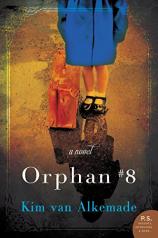Orphan #8
Review
Orphan #8
Set in the early to mid-1900s, Kim van Alkemade’s riveting debut, ORPHAN #8, chronicles the horrors endured by a young girl, Rachel Rabinowitz, who loses her parents at the age of four and is placed in Manhattan’s Hebrew Infant Home. Separated from her brother and the outside world, Rachel is subjected to medical experiments that leave her disfigured and place her at the mercy of her fellow orphans’ taunting and name-calling. These injustices and her responses to them set Rachel on the path to becoming a successful nurse, but her journey also includes impossible choices that leave her --- and the reader --- struggling to separate mercy from defeat.
When we meet Rachel, she is a rambunctious little four-year-old prone to fits when she does not get her way. Though she has two loving parents, the only person who can calm her when she is upset is her brother, Sam, who teaches her the things he is learning as a first-grader. One day, however, Sam and Rachel’s mother discovers that their father, Harry, is having an affair and threatens him with a knife. In the ensuing struggle, their mother ends up dead in a horrific accident and Harry flees the state, telling Sam that he must care for Rachel as the man of the family. Although the reader is given only a brief glimpse into Rachel’s life before the tragedy, van Alkemade creates such a thorough portrait of the Rabinowitz family that the children’s loss is felt profoundly.
It is no secret that the orphanages of the early 1900s were underfunded and overwhelmed, but it is also true that there were several kindhearted workers who truly cared for their charges. As Sam and Rachel are shuffled through an adoption agency and separated into different orphanages because of their ages, we meet several of these maternal figures, only to watch as they slip through the children’s hands, leaving them orphaned time and time again. van Alkemade’s writing is absolutely gripping in these passages, making the reader feel every bit as hurt and vulnerable as Rachel herself. That is, of course, until she catches the eye of the ambitious Dr. Mildred Solomon, a woman who seems to care for her like a mother.
"Rather than simply telling us that Rachel is conflicted, vulnerable and deeply hurt, van Alkemade does a spectacular job of truly showing us her pain, an impressive feat for a debut author. Equally admirable is van Alkemade’s careful, unflinching research into orphanages, medical experiments and cultural shifts of the 1900s."
It is important to note that ORPHAN #8 is written in chapters that alternate between Rachel’s life as an orphan and her future as an adult nurse who works in Manhattan’s Old Hebrews Home. Just as we begin to feel the tiniest bit of hope for Rachel the orphan, Rachel the nurse is assigned with caring for the elderly, cancer-stricken Dr. Solomon. Her horror and disbelief heighten the suspense as we watch Rachel struggle to impress and befriend Dr. Solomon --- even as the doctor proposes a seemingly dangerous experiment. Granted access to the orphanage’s X-ray machines, Dr. Solomon will feed eight orphans barium, then take X-rays as the poison passes through their gastrointestinal systems in order to study the digestive tract. Although we know today that X-rays can be highly dangerous, there were no such warnings in the 1900s, especially not for studies carried out in the name of science. And so the reader must watch helplessly as Rachel is subjected to these cruel tests, her innocence allowing her to believe that Dr. Solomon cares for her.
With careful clues and subtle hints, van Alkemade reveals the results of Dr. Solomon’s tests: Rachel has alopecia. Even worse, she believes it to be caused not by pointless tests, but by necessary treatments to some childhood ailment. With the arrival of Dr. Solomon, however, her curiosity is peaked, and she soon discovers the painful truth. Finally presented with a history that fits, Rachel examines the lingering effects of Dr. Solomon’s work and finds that she may be hiding more than she has ever let on. As she plies Dr. Solomon for an apology, she begins to see that the doctor’s side is far more complex than she previously believed. Now Rachel --- a girl who has never had the power to decide her own fate --- has another human’s life in her hands, and the choice between revenge and mercy is all hers.
Although ORPHAN #8 is absolutely heartbreaking at times, there are still wonderful moments that fill the reader with the hope necessary to suffer through Rachel’s pain. During her orphanage days, for example, we watch as she accidentally becomes a nurse’s aid and quickly proves herself a smart, competent nursing student. As van Alkemade allows Rachel to rise from nothing and flourish, the reader cannot help but feel a nearly parental pride for the young girl. Later, when she finds a family willing to help her continue in her field, hearts will swell as she is finally able to experience the warmth of a family’s support. These brief vignettes turn Rachel into a dynamic character, as opposed to the broken little girl we first met. Her struggle to understand Dr. Solomon’s point of view highlights her capacity for empathy without contradicting her lingering need for revenge.
Rather than simply telling us that Rachel is conflicted, vulnerable and deeply hurt, van Alkemade does a spectacular job of truly showing us her pain, an impressive feat for a debut author. Equally admirable is van Alkemade’s careful, unflinching research into orphanages, medical experiments and cultural shifts of the 1900s. Instead of peppering in obvious facts, she creates truly immersive settings, allowing readers to jump back in time from the safety of their homes. I’m sure I’m not the only reader looking forward to seeing what time period van Alkemade chooses to tackle next.
Reviewed by Rebecca Munro on August 7, 2015
Orphan #8
- Publication Date: August 4, 2015
- Genres: Fiction, Historical Fiction
- Paperback: 416 pages
- Publisher: William Morrow Paperbacks
- ISBN-10: 0062338307
- ISBN-13: 9780062338303





